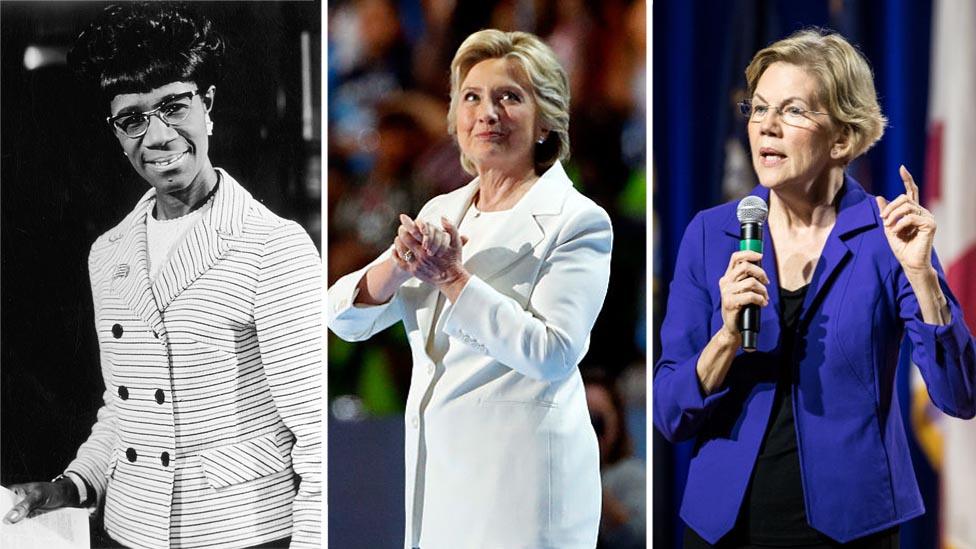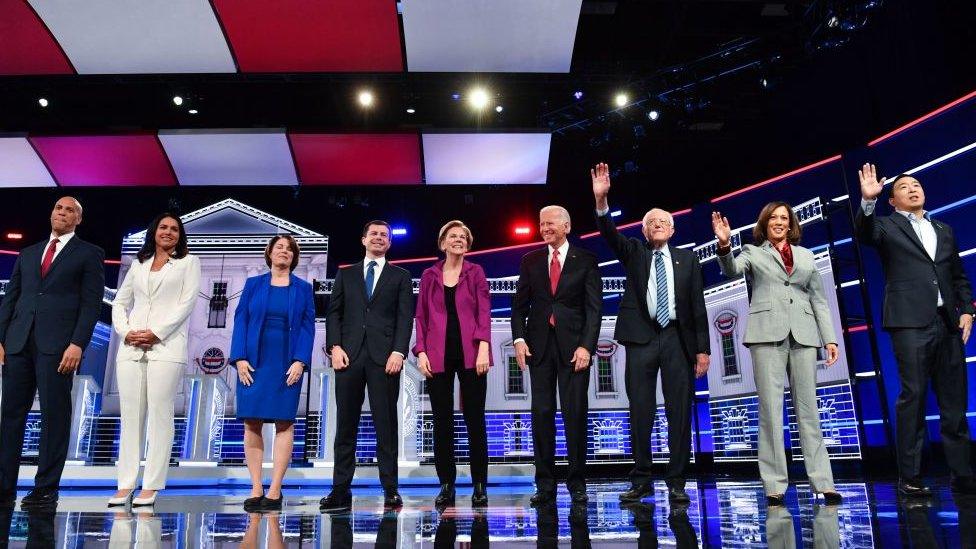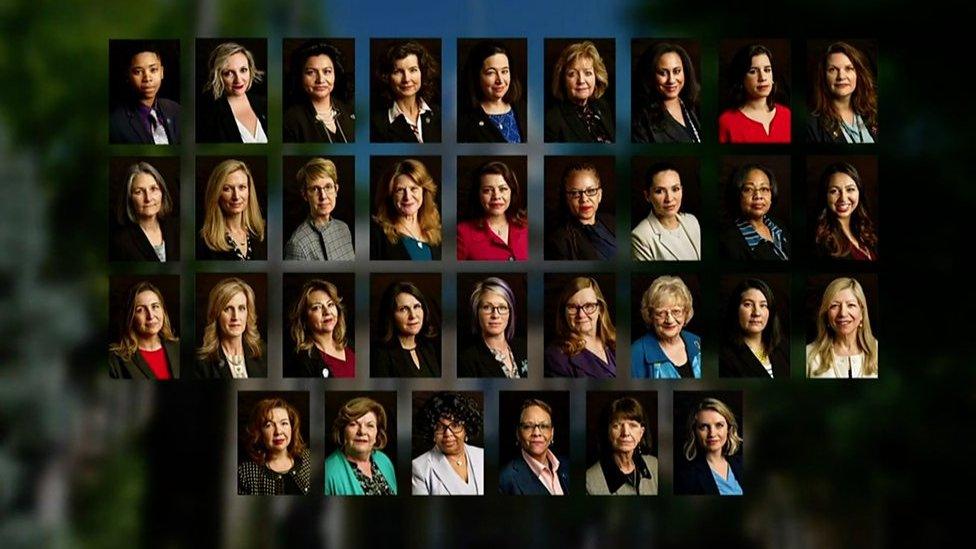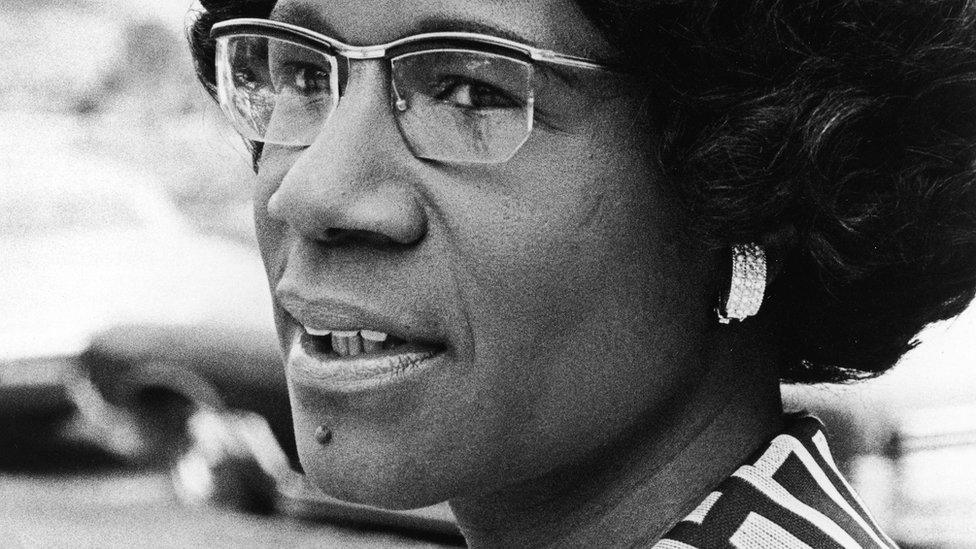Why the wait for a female US president goes on
- Published

Democratic presidential hopefuls (from left) Shirley Chisholm, Hillary Clinton, Elizabeth Warren
With US Senator Elizabeth Warren withdrawing from the race for the White House, what began as a diverse field of Democratic presidential hopefuls has turned into a familiar contest between two white men. Katty Kay explains why America won't have its first female president just yet.
Tulsi Gabbard has many distinctive qualities. She's a Hawaiian Army National Guard Major, the first Hindu member of Congress and the first Samoan-American voting member of Congress but she is not going to be president of the United States.
She is not even going to be the Democratic Party's nominee for the presidency.
(Given that Gabbard met President Bashir al Assad of Syria in 2017, after his forces had bombed Aleppo to smithereens and failed to condemn him, it's pretty extraordinary that she is still in the Democratic race at all.)
No, she won't be America's first female president.
And, this time around, nor will any other woman.
As Elizabeth Warren said so poignantly, if American girls are looking for a role model in the Oval Office, they will have to wait another four years.
What happened to diversity?
The Democrats started this race, way back when Neanderthals still roamed the Earth it sometimes feels like, with a host of non-white, non-male candidates. One by one they dropped out.
If you want change in America in 2020, it seems, you are better off going with a white man in his 70s.
Warren referred to sexism in her farewell address. It's not the same sexism Hillary Clinton encountered when she first ran in 2008.

Democratic presidential hopefuls (from left) Shirley Chisholm, Hillary Clinton, Elizabeth Warren
Back then souvenir shops sold nutcrackers in the model of the woman who'd both been a successful secretary of state and a US senator - if you're a successful woman, they implied, you must a ball-cracker too.
"Men beware" was the none-too-subtle message. Nor is it the sexism of the pointless, largely unflattering discussion of Clinton's trousers suits.
It is more subtle today, but Warren is right, there is still sexism.

Amy Klobuchar (third from left) and Kamala Harris (second from right) were other serious candidates who quit
It took the form of a conversation about "electability."
Democrats are desperate to beat Donald Trump and they want a candidate they believe can do that.
No one disputed that Warren ran a really strong campaign. She has detailed policies on many of the key issues voters care about, although some clearly found her to be too left-wing. But whether you agree with her plans or not, she was certainly as qualified as the men in this race.

What are Warren's key policies?
Wealth tax on the ultra-rich
Universal child-care
Single-payer healthcare system, paid for by taxing corporations and shifting existing spending
Free public college
Student debt-relief based on income
Ban assault-style weapons, implement universal background checks

By rights she should be in the top tier at this stage. But this issue of electability kept tripping her up. It was code for "Americans just won't elect a woman and the stakes, this time are too high."
"Little girls will have to wait four more years for a woman president"
Asked by pollsters, most people said they would, of course, vote for a woman but they were pretty sure their neighbour wouldn't. Therefore, Warren was deemed less viable as a national candidate, largely because she is a woman.
A new global survey, the UN's first ever gender social norm index, may provide the answer. This isn't actually just an American problem.
Data from 75 countries, home to 80% of the world's population, found that almost half of all people feel men make superior political leaders.
I wish I could say I was surprised. (Though the survey's other finding that almost one third of the world's people think it's acceptable for a man to beat his wife did shock me. Really?)
So electability, it turns out, is code for male. In America it is code for old, white, straight male.
When will that change?
- Published4 March 2020

- Published26 January 2016

